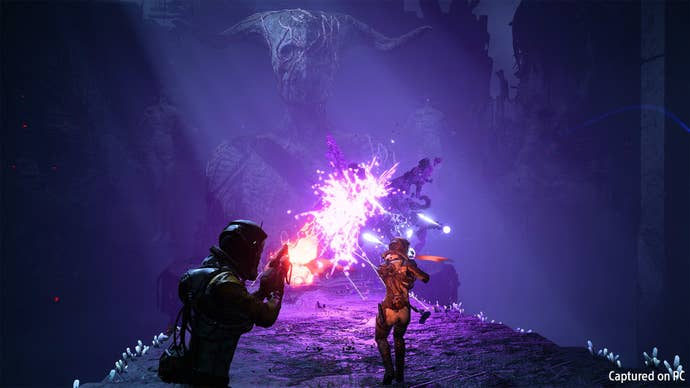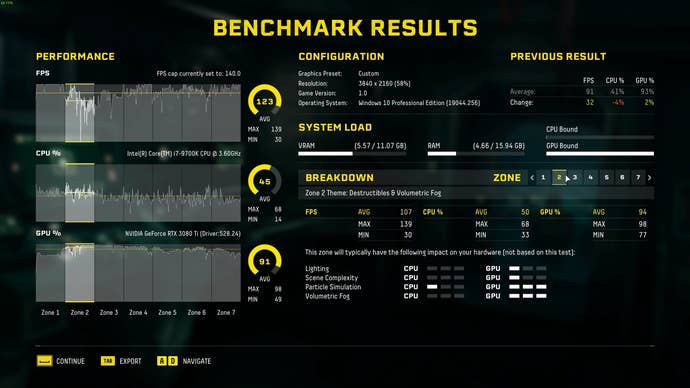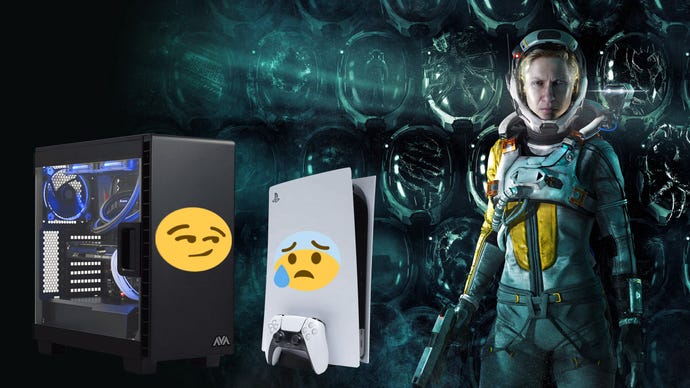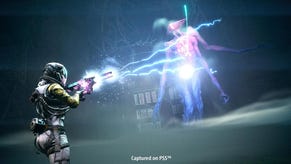The best PS5 game is now on PC, and it's even better
Returnal arrives on PC less than two years on from its initial release on PS5, and there's never been a better time (or better way) to play Housemarque's modern classic.
Returnal is Housemarque’s most interesting, and most ambitious game. It builds on everything the studio perfected over the years - the satisfying arcade-inspired combat, the particle-filled visuals, and the tightly structured levels that always leave you wanting more.
If you’re fan of Housemarque, you can safely expect all of those qualities to be present in its games, but what you might not expect is how the same principles that guided it for years can be transferred to a third-person perspective. To such a degree that it not only justifies the shift, but makes use of the game’s rogue-like nature in a way few games do.
Returnal is a game about an astronaut, Selene, who can’t escape the grim loop she’s trapped in. It starts with her crashing on an alien planet, seemingly for the first time, until she comes across corpses of her past selves – failed attempts – and realises she’s been endlessly re-living that moment, eternally returning. Countless times she’s killed by the projectiles of tentacled Lovecraftian monstrosities, their lunges, or after failing a jump.
Every time she comes back, the world changes – hence the rogue-like nature. Atropos, the planet Selene is stuck on, seems to operate on a different timeline from her own. As you play, you’ll be exposed to new rooms and new events that continue building up on the narrative. If you like poking your head around every corner, you’ll pick up more ciphers that let you understand the language of the people who live/lived there, and make sense of their monuments.

All of that comes to PC, including all the post-launch updates the original game received. You can play it in co-op, and suspend your run if you want to stop and pick it up later – a luxury many of us who played it at launch on PS5 weren’t afforded.
The PC version is superior, however, in every way. The same haptics and impulse trigger effects can be enjoyed by simply plugging in a DualSense controller. All the 3D audio wizardry that elevated the experience on Sony’s console is also here, and the game even offers multiple different versions of audio virtualization.
The benefits of playing on PC are numerous. Chiefly, you can play it with a mouse at framerates in the hundreds, well above what you can get on PS5. Depending on your hardware, you may even get to experience a sharper, more visually impressive presentation.
But what really makes PC the best place to play Returnal is just how well-thought out the port is. There’s a wealth of options, each offering multiple levels of quality. You can upsample, downsample or use any of the popular image reconstruction techniques like DLSS and FSR.
Climax, the studio responsible for the PC port, made it so that anyone unfamiliar with what each setting affects can still navigate and understand that menu. There are descriptions for each option, along with a guide on whether they’re CPU or GPU-heavy.

The cherry on top is Returnal’s benchmark tool, which is one of the most informative I’ve ever seen in a PC game – let alone a port. It’s up there with the likes of Gears 4 and 5 in the level of granularity it offers, and I would say it even goes beyond those in key areas.
The benchmark not only runs through real gameplay scenarios, its different stages target specific areas: destruction, visual effects, reflections and so on. It also tells you which effects push your CPU and GPU, and it ends with a breakdown of the data gathered through it. It allows you to make the decisions you need to hit your framerate targets, and even helps with some recommendations and easy access to the settings menu, where you can quickly go to tweak a setting and re-test.
Outside of some random stutters, Returnal runs pretty well on my PC. Although it does pre-compile shaders upon first launch, stuttering does occasionally occur when travelling quickly through its detailed rooms. It’s likely related to asset streaming. Although I have it on a Gen.3 NVMe, it’s nowhere near as fast as the one inside the PS5.
The game’s PC specs ask for 32GBs of RAM at the high end, likely as a way to get around drive speed on PC. My PC has an i7-9700K, a 3080 Ti, and 16GB of RAM. Even then, with all settings maxed out and ray tracing on medium, I rarely dip below 80-85fps at 4K with DLSS on Balanced.
There’s a level fairly late into Returnal that easily has the most compelling structure in the game. It marries theme with music, and builds up (both physically and emotionally) to a rise that makes clear to anyone who’s been paying attention to the narrative that they’re about to witness something special.
The rogue-like nature of Returnal means that level won’t be experienced by plenty of players (and many certainly didn’t on PS5, either). But if you stick with it, you’ll be excited, sad and feel triumphant in a way few games can offer. Returnal’s most memorable moments arrive when all of its individual elements come together to sing and ding to the same beat.
If nothing else, I hope that being on a much bigger platform means millions more will get to be in that trance.
Impressions based on PC code provided by Sony.








